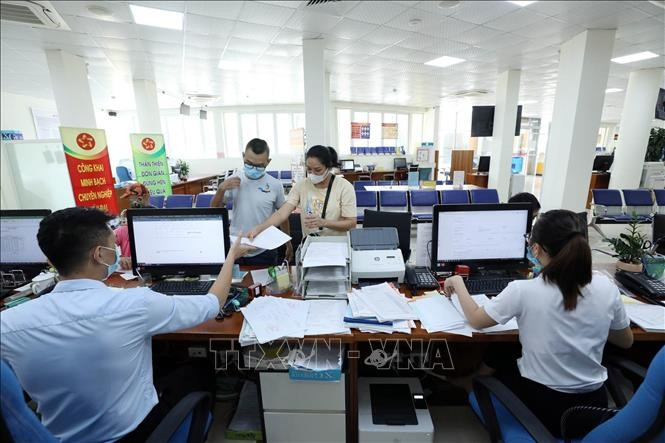The Ministry of Home Affairs has just submitted to the Government a draft Decree promulgating the Code of Public Ethics.

People come to submit their applications at the Lang Son Provincial Public Administration Service Center.
This is the fourth revised draft. Compared to previous drafts, this draft has adjustments in scope, regulated objects, purposes, ethical standards, communication standards, and behavior.
According to Dr. Nguyen Huyen Hanh, Deputy Director of the Institute of State Organizational Sciences (member of the Drafting Committee, Head of the Editorial Team of the Draft Decree promulgating the Code of Public Ethics), this draft is more concise, providing a framework and principles, on that basis, each agency and unit will specify regulations suitable for their agency and unit. The draft reduces specific and qualitative acts.
The purpose of developing and promulgating the Code of Public Ethics is to ensure integrity, civilization, professionalism, and conformity with the duties and responsibilities of cadres, civil servants, and public employees; to serve as a basis for cadres, civil servants, and public employees to cultivate and train themselves, and to raise their sense of responsibility in the work of preventing and combating corruption and other negative manifestations.
On May 25, the Ministry of Justice organized a review of the draft Decree. Regarding the regulation "only receive individuals and organizations at agencies and units; not to make appointments, receive citizens and organizations outside working hours, outside agencies or at private homes", Dr. Nguyen Huyen Hanh said that this regulation is not new, the Law on Citizen Reception has clearly stipulated that receiving and working with citizens must be done at headquarters, the draft Decree is only systematized to stipulate more clearly.
The Ministry of Justice believes that, in essence, the behavior in this regulation is not a problem. However, in response to comments, the Drafting Committee will revise the regulation to be strict and clear, in the direction of clearly stating that it is not allowed to meet, receive citizens and organize outside working hours, outside the agency or at private homes to resolve the agency's work. As for civil relations, meetings and exchanges are normal. Drafting such regulations is to prevent negativity from arising.
At the meeting to review the Decree, according to Dr. Nguyen Huyen Hanh, many opinions suggested and discussed enthusiastically about the need to stipulate a provision on "communication and behavior on social networks". This is an issue related to most cadres, civil servants and public employees. From this suggestion, the Drafting Committee will accept and add a separate provision on communication and behavior of cadres, civil servants and public employees on social networks and the internet. For example, it is not allowed to post, share, or comment on unverified or unauthenticated information. This is to preserve the image of cadres and civil servants.
This draft clearly stipulates that no personal matters are to be resolved during working hours; no commercial advertising, sales, or marketing of any kind is to be carried out at the workplace.
The 2019 Public Service Culture Project stipulates that "Civil servants, public employees, and officials must not flatter or curry favor with superiors for impure motives". Incorporating opinions from ministries, branches, localities, and experts, the Drafting Committee has added to this draft the provision "no flattery" in Article 6, Chapter II on Ethical Standards (the recent draft did not have this provision). Accordingly, the ethical standards of cadres, civil servants, and public employees are the spirit of service; integrity; uprightness; dedication; thrift; and anti-waste. In particular, Article 6 on Integrity clearly stipulates the standards: Honesty, propriety, impartiality, straightforwardness, no flattery; daring to think, daring to speak, daring to do, daring to take responsibility, daring to innovate, daring to face difficulties and challenges for the common good; resolutely protecting the right, not covering up violations of the law by individuals and organizations.
“This is a decree regulating ethics, only talking about general standards. Many opinions suggest clarifying this behavior or that behavior, but the more specific it is, the more it is lacking,” Dr. Nguyen Huyen Hanh shared.
Talking about the Ministry's expectations when issuing the Code of Public Ethics, Deputy Director of the Institute of State Organizational Sciences Nguyen Huyen Hanh said that the Minister of Home Affairs is very dedicated and concerned about the issue of public ethics, embezzlement, corruption, and deviant behavior among the staff. Therefore, there needs to be a document to serve as a legal basis, a framework for cadres, civil servants, and public employees to follow, and also a framework for annual evaluation of cadres, civil servants, and public employees, and a basis for handling violations. More broadly, it aims to build a clean administration, a team of cadres, civil servants, and public employees who are truly honest and serve the people.
This draft focuses on three main contents: ethical standards; communication and behavioral standards; administrative discipline and order. This is a difficult issue, but it cannot be left unregulated. Previously, there was a Project on Public Service Culture, now it is a decree - a mandatory legal document.
According to VNA